As an amateur scholar and die-hard enthusiast of everything to do with Alice in Wonderland, I have launched a podcast that takes on Alice’s everlasting influence on pop culture. As an author who draws on Lewis Carroll’s iconic masterpiece for my Looking Glass Wars universe, I’m well acquainted with the process of dipping into Wonderland for inspiration.
The journey has brought me into contact with a fantastic community of artists and creators from all walks of life—and this podcast will be the platform where we come together to answer the fascinating question: “What is it about Alice?”
For this episode, it was my great pleasure to have Adrienne Kress join me as my guest on this episode! Read on to explore our conversation and check out the whole series on your favorite podcasting platform to listen to the full interview.
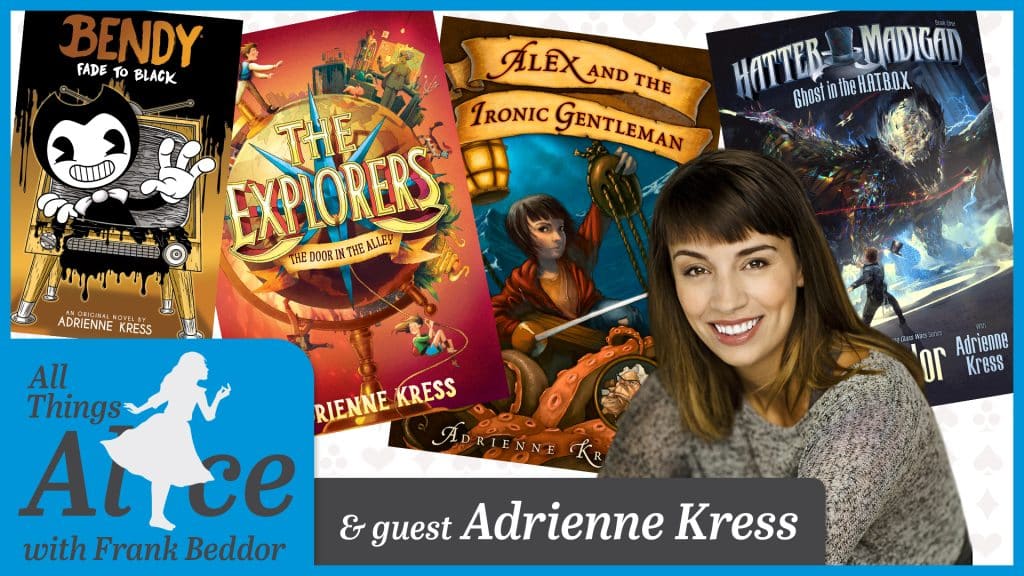
Frank Beddor
I want to talk about your books and writing. But I didn't realize that you started as a playwright. You started as an actress, as well, so I want to talk about that.
Adrienne Kress
I’m also a producer now. So we have that in common. My husband and I produced this very small indie horror movie over COVID.
FB
Congratulations on that.
AK
Thanks. We wrote it. He directed. I starred in it. We were supposed to go on a honeymoon in 2020 and that didn't happen so we used that money to make a little movie.
FB
What does that say about the launch of your marriage?
AK
That was how I knew I had met my soulmate.
FB
I’m interested in the acting part of it because I started as an actor. I had been doing commercials for ski companies so I caught the bug. You started really young though, as a kid.
AK
I did theater school first so I wasn't doing professional gigs until high school. I was studying at art school and doing plays. So it's interesting because with theater acting, even if you're 10-11 years old, there's still all this technique just by virtue of being on stage.
There are definitely habits you learn and then when you get older, and you're suddenly in theater school in England as an adult, they're like, “You need to just relax. You overthinking it. It became less about technique and more about just being in the moment.
FB
I found it hard not to try and do what I thought they wanted. The performance versus tapping into my own truth at the moment. Auditioning was very, very scary and daunting. But in terms of the couple of movies I did, I thought, “Oh, if you're just really relaxed, and you start by being yourself and then think about what to bring to it, you find a voice at the moment.” Did you find the same thing? What was your approach?
AK
Absolutely. I came to film acting after theater acting. One of the things almost all theater actors will tell you is there's a steep learning curve of doing less, do nothing at all. I found that very challenging, but at the same time, I agree, it's very freeing, with film, to have multiple chances to do some things and multiple takes. You’re also having an intimate moment, just between you and the other person, but there happens to be a camera there. It's very freeing.
But I'm with you on auditions. I think I've gotten to a place now with auditions where I'm just like, “If they want me, they want me.” If they want what I can do and they want what I look like, they will want me. If they wanted someone else then they didn't want me. I know I'm good enough that it's not going to be, “Oh, no, this person is terrible. Why would we work with her?” It's very much centered on what they're looking for on there. I'm a lot more relaxed than I used to be. I used to be so wound up and tried to read their minds. What do they want? Now my attitude is I'm just gonna take advantage of this moment to act because it's not like you get a ton of gigs.
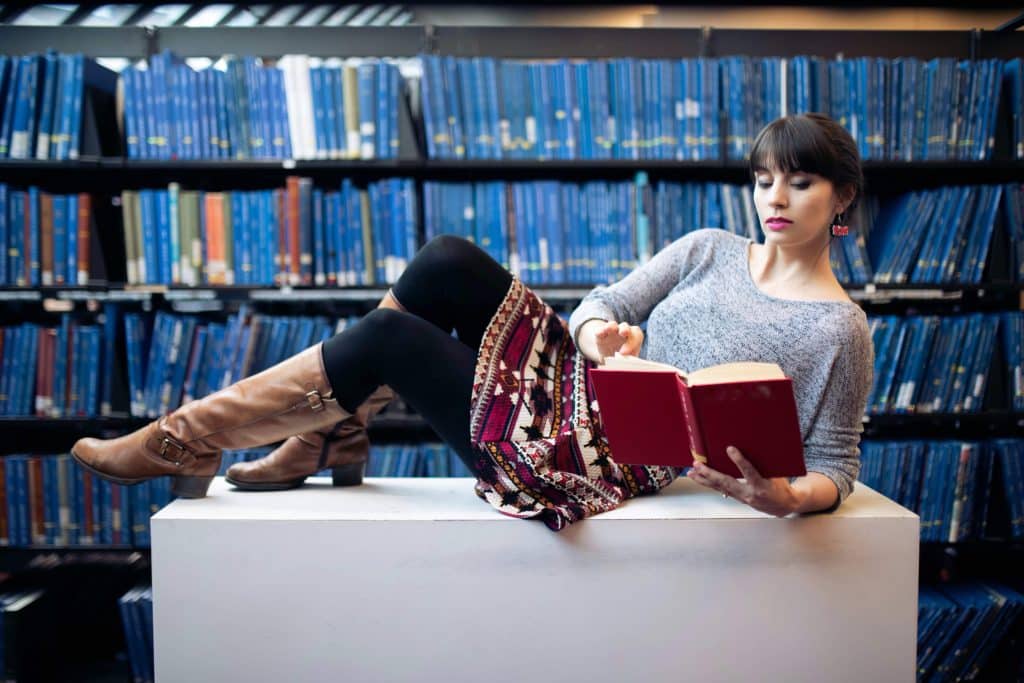
FB
I was shocked at how little you have to do in film. It's you. It's just the thoughts that come into your mind, through your eyes, and in your expressions. If you try, you're dead. You're overacting. That was startling to me.
AK
It’s completely different and it’s very hard. It’s tough when people will fall down. Sometimes, actors aren't to blame if there's a bad performance in a movie or TV show but nine times out of 10 what that actor is doing is still very, very difficult. It's all the stuff around it, whether it's the lines or whether they were given time with the work before shooting because I don't think people realize how hard it is to do nothing. It's really, really hard.
FB
It’s really the thought process. You have to prepare and you have to get in that frame of mind so you're thinking the thoughts that get communicated. Much like writing. You have this idea that you're trying to communicate with a sentence or a paragraph or a Chapter, and you think, “I think I know what I'm feeling and it's just gonna come off the page. Is there any chance this is gonna happen? Probably not.” At least that's how I felt, there's no way they're gonna get this.
AK
It’s the best feeling when they do.
FB
Both in acting and in writing. When they come back and ask you, “Subtexturally, what was going on for you when you were creating or writing that scene?” And the same thing with acting. It's so effortless, right?
AK
Probably in all areas of life, the more effortless the thing looks the more effortful we're not to assume it is. The more impressed we shouldn't be.
FB
That's so true. When I was acting, one of my acting coaches said that if you really want to understand the playwright, you have to understand who they are as a person. Read their biographies or learn why they're telling the stories and that will give you hints into the text. Then she had me write the scenes before the scene you're acting as if you were the playwright. That’s what queued me into wanting to write books because I love playwrights and I think the work is remarkable, how so much of it comes through this dialogue. But that experience of writing out the scene before the scene I was acting was what motivated me to start writing.
So I'm curious about you. First, you had English teachers as parents, that seems like a high bar to deal with. It’s in your DNA. Obviously, you started writing. Tell me about writing plays and ultimately how the process of writing a play might inform the actress you are.
AK
I love that question. I was always writing things. My dad taught creative writing, so, when I was five, he’d have me do exercises he was doing with his high school students. I was always creating stories and playing make-believe. But when I came to playwriting properly, I had been a drama major for long enough that I'd seen enough scripts that writing plays came from understanding character as an actor. That has also translated into the book writing subsequently, but with writing plays, as you said, they’re generally very dialogue-heavy. That’s really what you have to go off of as an actor and as a director. I think that led to my very, very dialogue-heavy books. Writing dialogue is probably my favorite thing to do in general and specifically in books and then in one of the Bendy books, The Illusion of Living, I literally just put in a short play. So I guess the acting informed the playwriting, which in turn informed the book writing so it does come back to acting for me, being inside the head of the characters and going inside out. I think there are some authors, like your George R.R. Martins or Tolkiens, who might create mythos and world-building and then think about how to tell the story and which characters they need to tell the story. Whereas I generally come from the germ of the character.
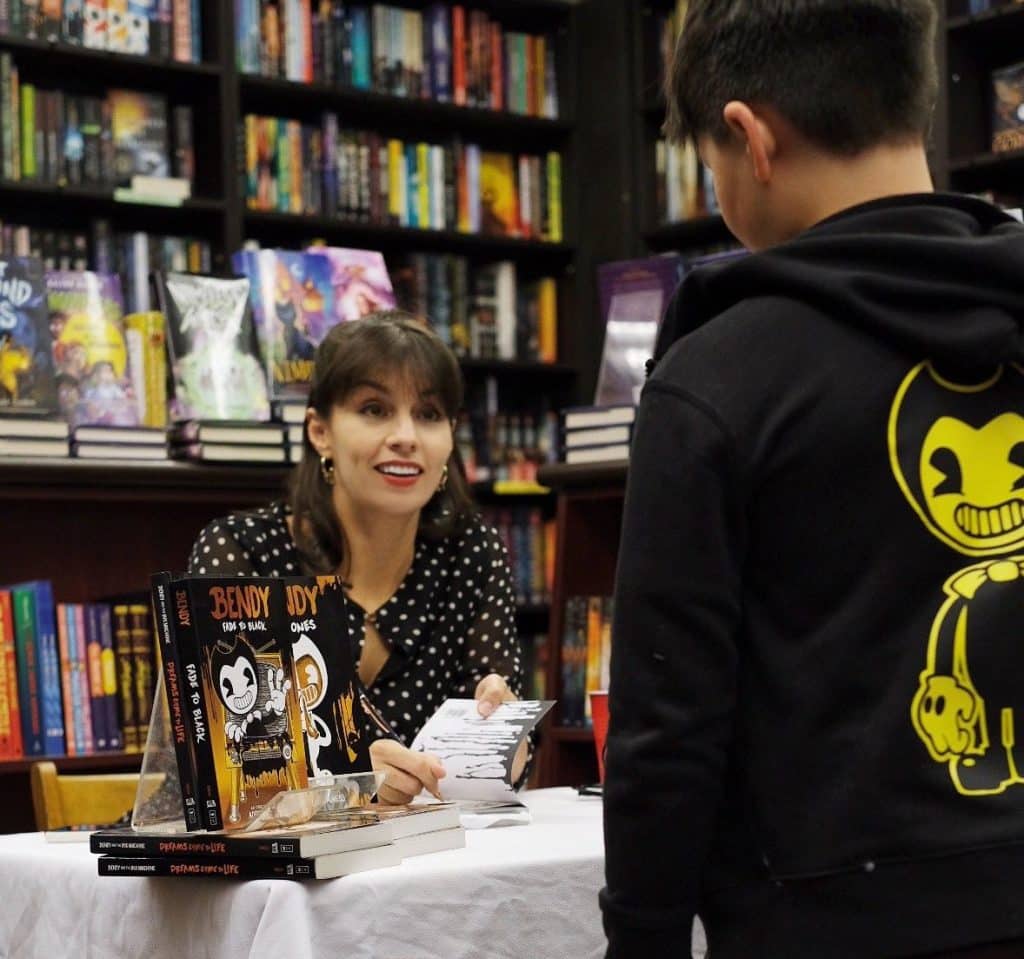
FB
That makes sense to me as well. Do you say the dialogue? Do you read the dialogue out loud? Do you play the different parts when you're writing a play or prose? Or do you read it to somebody and see how it works or do you just trust it?
AK
I can be just going for a walk or something and then start to create a little dialogue in my head. I do a weird sort of humming, which I only realized I did recently. I'm reading not even just dialogue but any words on the page, but I'm not saying the words out loud. So I'm constantly reading out loud, but it's very small. With plays you often workshop and take them out to actor friends. With books, obviously, I have beta readers as you know. My parents, the English teachers.
FB
Really? I have two kids and my son is writing essays for college and I’m like, “Hey, do you want me to read your essay?” He goes, “Oh, no, I'm good dad.” Really? You don't want me to take a look at it? I'm a writer.
AK
He can take advantage of it.
FB
He came around. But I have to be very careful in terms of walking him through any ideas or changes. If I'm too forceful he shuts down. My daughter doesn't show me anything unless she's under a deadline and she's stuck. How were your parents?
AK
They're very good high school English teachers and I’m an only child so I was it. They would go, “Oh, this is an interesting idea. Hey, Adrienne, have you heard of it?” Not just when it comes to writing, there was always a lesson to something or an educational component growing up. Having them look over my schoolwork growing up, it's just the next step.
FB
You felt they fostered your work and your homework and your creativity, and you didn't really bump up against them because they were good teachers.
AK
They're good at being harsh, which is the point. The good thing about my parents when it comes to this is they're very honest. They've always been very good at being that teacherly, “Okay, so I'm not sure this bit works and I'll tell you why.” But they were also so supportive of all my creative endeavors and very proud and impressed by me, which is nice. It also meant that I had confidence in what I was doing. Even though it always hurts, whether it’s editors or your parents, to hear this isn't quite working or they didn't like this bit. That will always be like a dagger. I also had the confidence that generally, my work was good so I kept moving forward. Also since my first book, Alex, I'll say, “No, I disagree. I want to keep going with this.” I've also always had that relationship. It's not, “We're the parents, therefore we're right and you're wrong.” It's always been a conversation.
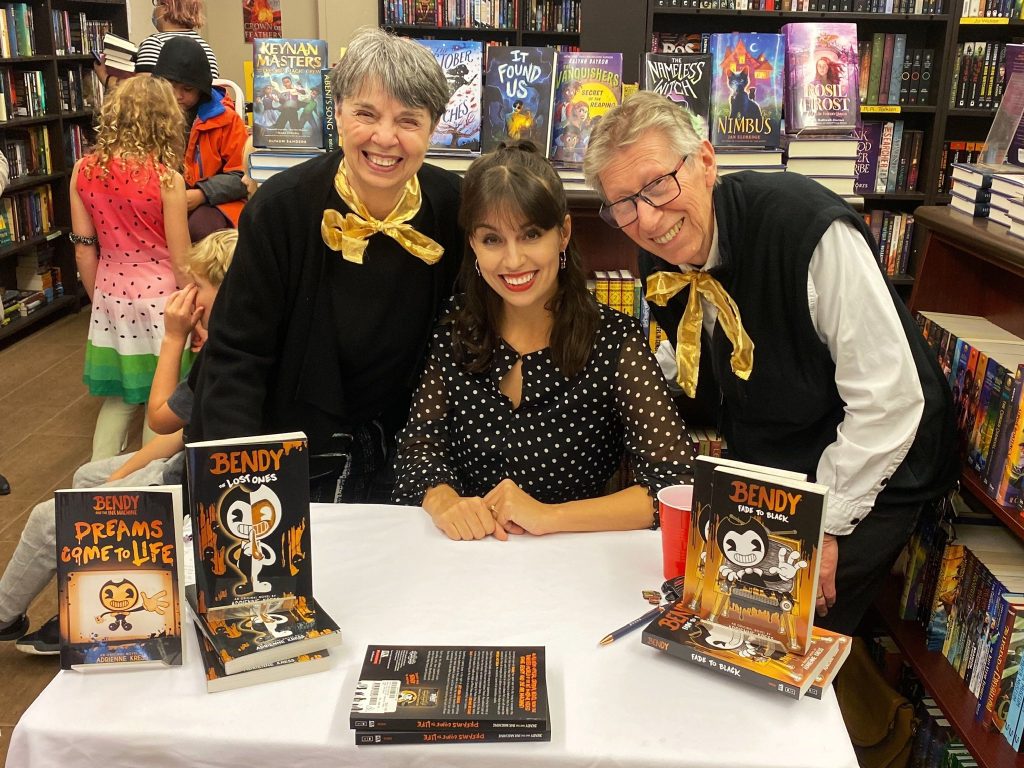
FB
So you’re equals when it comes to the creative process.
AK
Maybe when I was a little younger, I probably couldn't have fought but now yes and it's great. So I have my parents and I also have my agent. She's wonderful. Not all agents necessarily edit and they don't necessarily want to, but she's very good. We’ve been together for close to 15 years. She knows my work inside and out and I really respect her thoughts. Again, it's the same vibe as with my parents.
FB
That's what a good editor does. My editor made a point of saying, “This is your book. I love everything that you're doing. Now, I'm going to send you a couple of suggestions.” So after softening me up, then the suggestions come and it’s page after page.
AK
I think it's called the sandwich method. Praise at the beginning, then you give your critique and then you end with praise. I've definitely had editors use that on me, as well.
FB
What was the first thing that you wrote that was really satisfying and gave you that start of confidence? Was there a moment when you said, “I think I want to do this and I can do this?”
AK
I have no clue when but my mom and my dad, specifically with his creative writing, started teaching me creative writing. But, from birth, it feels like I've had competence in my storytelling ability. Writing stories in English class in elementary school was always my thing and I always got really good grades. I had all the validation in the world. I did a book with a friend. She and I were both known for our creative writing and it was so popular that the principal got a copy of it. So I've always had that validation. Then throughout high school, I was doing creative writing classes. But in my last year of high school, I wrote a play for a playwriting class. It was probably one of the first one-act plays, a properly structured play that I wrote was chosen for a student-run one-act play festival. All the producers, directors, writers, actors, crew, everybody were students. One of my friends was chosen to be a director and he chose my play and I was cast in the first play of three. So I was there every night and I would sit at the back of the audience for the third play, which was mine, and listen to it being performed.
It’s what we were talking about earlier when you write something and you hope to get an effect. When people laughed at the jokes right on cue as if they were being directed to, I thought, “Is this a better feeling than acting?” I still don't have the answer, but it was really up there. So I became really interested in playwriting at that one, not so much novel writing. Then I went through drama school for university and in my last year of theater school at the University of Toronto I did another playwriting class and it was taught by this incredible Canadian playwright, Janet Sears, whom I'd studied already. It was this great intimate, seven-person class that you submitted writing samples for to get in. The way she structured it was amazing. The class all bonded and we got on great. The assignment was a one-act play and we had these tutorials halfway through the term, as we were in the middle of writing, and we were just chatting and I was saying, “I'm not sure this might be two acts. I don't know.” And she said, “With you, Adrienne if you want to just make this one act for a two-act play, I'll let you do this. Because I think you're really good at this and I know how much you like acting but I hope you keep writing as well.”
I’m paraphrasing but I just remember the moment. Up until that tutorial session my attitude was, “Yeah, I love to write creatively and I guess I'm good at it. But don't we all like to write creatively?” I guess it was the first time a true professional had called me out as having some sort of skill that was at a certain level that I wasn't aware of myself.
FB
Those are really clear moments because of the way that you were describing coming out of the womb almost with a notebook and your dad saying, “Let's get to it,” it was just part of who you are. But we all need that validation or that really clear moment where you see the audience responding as if somebody said, “Hey, by the way, the writer is in the audience. So make sure you laugh at these five places.” Then of course you have a professional validate your work.
AK
It was everything. I turned my focus to playwriting after that. I went to the London Academy of Music and Dramatic Art and did a yearlong classical acting-specific program. After that, I tried to write some plays to direct and produce but I kept having trouble. So I decided to write a kidlet novel because I really love reading kidlit novels and it was a way to refresh my brain and completely cleanse the palate. It took a year. I’d never actually written more of a novel than 18 pages. So I kept writing and writing and writing and that ended up being my first published novel, Alex and the Ironic Gentleman. So what was supposed to be an interlude sent my career and everything about my life in a completely unexpected direction, which was being a writer of novels.
It sounds so much like actors who accidentally become actors and get the lead in something because they looked right. I never want to give that impression as an author that I just sort of tripped into it. I think telling the history of coming out of the womb and learning how to write, it's been in there the whole time. But it really was a sudden change of trajectory because everything in my head at that point was theater - write a play, direct a play, act in a play. Then Alex came along.
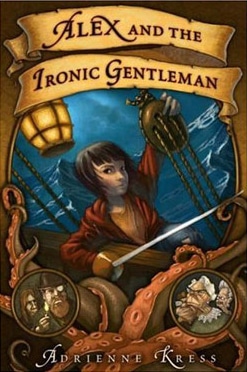
FB
Were you writing plays about young adults at the time?
AK
No, my plays were entirely about adults. They were sort of absurdist with some shocking moments of violence in them. But I was really into absurd things and I actually did the absurdity thing in Alex and the Ironic Gentleman. It was a very classic children's adventure, episodic adventure, very inspired by Alice in Wonderland. She has her main throughline of trying to go home but then she meets all these weird individuals and has these mini-adventures with them. I really structured the second act of Alex on Alice in Wonderland. Act One was more Roald Dahl-y and then Act Three was very Pirate-y, Peter Pan or Treasure Island. But I had gone from writing total adult stuff to even completely skipping young adult and going straight to middle grade.
FB
You said you read a lot of kids' stories growing up or as an adult to relax. Can you share some of those stories with us and what is it about those stories for you?
AK
I can talk about kidlit forever. I'm what's called a reluctant reader, which is a term that wasn't around when I was a kid, which is unfortunate because it's tricky to be the daughter of two English teachers and not really want to read. My parents had to do everything to convince me to pick up books but when I did pick one up, I was a voracious reader. I'd read it in a day and then I'd have to read everything by that author because I trusted that I would like that author. But even as an adult, I'm sort of that same way. If I read an adult book, I'm still like, “I don't know, man, I don't think I'm gonna like it.”
But growing up some of the first books that my parents really pushed on me were the Beverly Cleary Ramona books. They’re very entertaining and they're a really easy and fun read. My dad also really loved the adventure books by Enid Blyton. Some elements don't fully stand the test of time but I really glommed onto the adventure part of it. Then as I got a little older I got into Judy Blume. At the same time, my dad would also read to me every night, Alice in Wonderland, Peter Pan, The Hobbit, and all The Lord of the Rings, and he did all the voices.
My dad also introduced me to The Hitchhiker's Guide to the Galaxy when I was probably 12-13, which changed everything in my brain and really introduced the notion of absurdity and that kind of humor. That’s probably been one of my greater influences. But as I got older, young adult didn't exist as an actual named category but some books featured older protagonists that weren't adults. But you ended up jumping to adult and there were some adult books I enjoyed. I enjoyed Michael Crichton and Agatha Christie. I enjoyed books that had really forward-moving stories. But a lot of adult books I found were depressing and the arcs that the characters go on, by the end, you're like, “Oh, that's sad.”
In my last year of high school, we had an English assignment where we could compare any two books, so I chose Alice in Wonderland and Peter Pan. I really dug into those and as I was writing it, I realized what I liked. The idea with these kids' books is you're still dealing with big issues and strong emotions. Anyone who thinks there aren't big issues in kidlit hasn’t read any kidlit. They're just being snobs. The emotions are the saturated colors. They're not quite as messy. I like the saturated feelings and regardless of how dark it gets, and some of them get very dark, they always end on a hopeful note. As cynical as I can get with the world, I am, at the core, very optimistic. I believe in hope. So that's why I love reading those books. I kept reading them after high school, like A Series of Unfortunate Events, which sounds like it shouldn't have hope, but I was reading all of them.
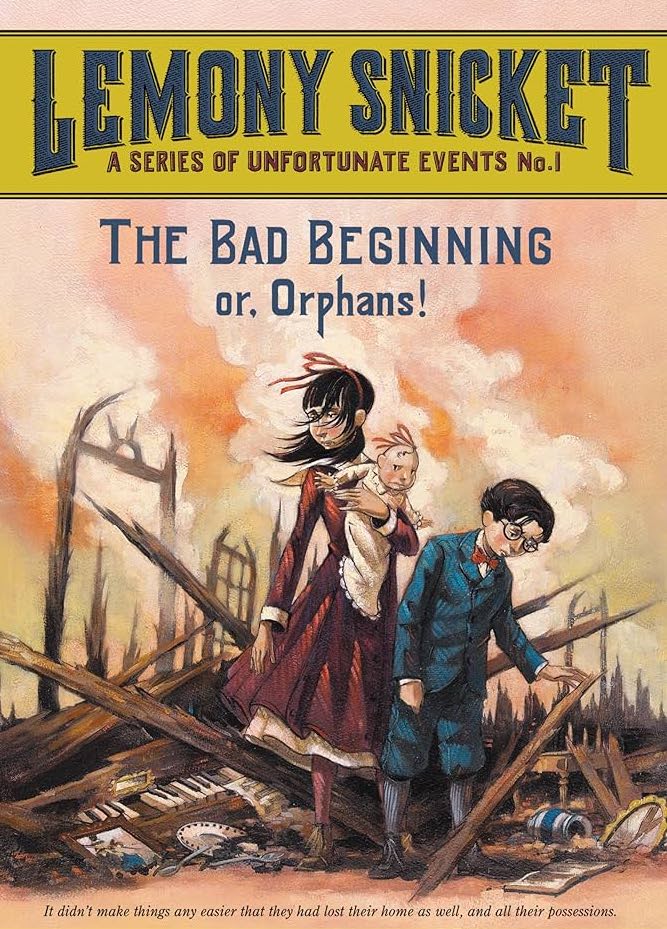
FB
I was reading the first book, The Bad Beginning, at a fancy resort, and I was by the pool and this woman was sitting next to me and she goes, “What are you reading? Isn't that for, like, elementary kids?” And I said, “No, it's not actually. It's amazing. You should check it out.” But she gave me so much judgment that I was self-conscious after that. I didn't know people across the pool were going to be judging my book. But A Series of Unfortunate Events is a dark story and just brilliantly told. The whole thing that he uses with vocabulary and spelling and spelling out this is what that means, it’s so perfect for kids, but adults can also read it and go, “That's so clever.”
AK
I think the best kids' books and kids' media are written and created on two levels. There’s the level of the audience it’s intended for, let's say the eight to 12 audience. But also, especially with books versus a Pixar film, kids' books are one of the last places where we still read out loud, where we still have an oral tradition. We don't do it so much with adult books. I think the way audiobooks have taken off shows how much we love them. But that communal experience of somebody telling a story is rarer and rarer the older you get. When I write kidlit, I keep in mind that there's going to be a teacher or a parent or somebody reading this to kids. I have some parent easter eggs in there, some jokes that probably the kids won't get yet. But also when the kids come back to it when they’re 10-11 or even in their 20s, they're like, “Oh, I didn't get that joke at the time.” I think there's always that nuance and depth.
But even if there weren't any adult jokes, there's just some great stuff in it. If you like the book, the book is meant for you. That's how I feel about this idea of gatekeeping ages. I actually have a more controversial opinion, which is with adult books and kids. There can be some stuff in an adult book that is intense and maybe certain kids shouldn't read it, but there are other kids who are ready for it. As long as you're having a conversation with them, and as long as you're having a parent or teachers talking with the kids and working through possibly more complicated issues, I actually think that's okay.
FB
What Pixar does so brilliantly is that it works for kids and adults. They have that four quadrant thing they talk about in marketing, which is why Harry Potter, became the book that was in the young adult section but all adults started reading it. Then it's okay to read this stuff. But nevertheless, you brought up Alice in Wonderland and Peter Pan, both of which, on the surface, are kids' books, but adults started reading them before any kids probably did, certainly with Alice in Wonderland.
AK
That’s the other thing. We, in retrospect, recategorize things. For people categorizing The Outsiders as Y.A., I guess it is. I don't know. But the young adult genre didn't exist (when it was published). I understand the need to find places to shelve things and I think that's important. At the same time, new adult is becoming a marketing category and there's been a lot of conversation about how we've lost the category between middle grade and young adult. By putting labels on things, we can exclude things. I think that's just something we know, in general. There’s a benefit to knowing and understanding what a category means and using that in a positive way but at the same time there are people I know who are trying to be published who have books where the characters are 13-14, or even up to 15, and we have the eight to 12 category. Even though 12 and up is the category for young adults, they want characters that are 16 plus. Because of the need to categorize, there is a wealth of books and writers that are being ignored because we don't know where to put them on the shelf.
FB
When The Looking Glass Wars was turned down by everybody in the States, my problem was that the lead character started as seven, the next time we see her she's 12, and then she's 18. It was after Harry Potter and everybody said, “Well, I don't know where this fits, and who did you write it for?” I didn't know that there were categories. The categories were just coming into shape.
I think the middle-grade genre or categorizing middle grade is smart because after doing a lot of school visits, those six-, seven-, and eight-year-olds are looking for somebody to aspire to who's not a teenager. So if you have a 13-year-old character, that's pretty spot on. And they do the lion's share of the reading. They have more time.
AK
Yes. So you have teachers and librarians who are reading to them and introducing them to these books. We don't have that as much in high school and we certainly don't get opportunities as adults. I'm not a parent myself, but when people become parents, they get that opportunity again, and they get excited. “We get to go to the library and have somebody read to us.” We should have adult reading time because it's something that's in our DNA. We want to sit around the fire and tell stories.
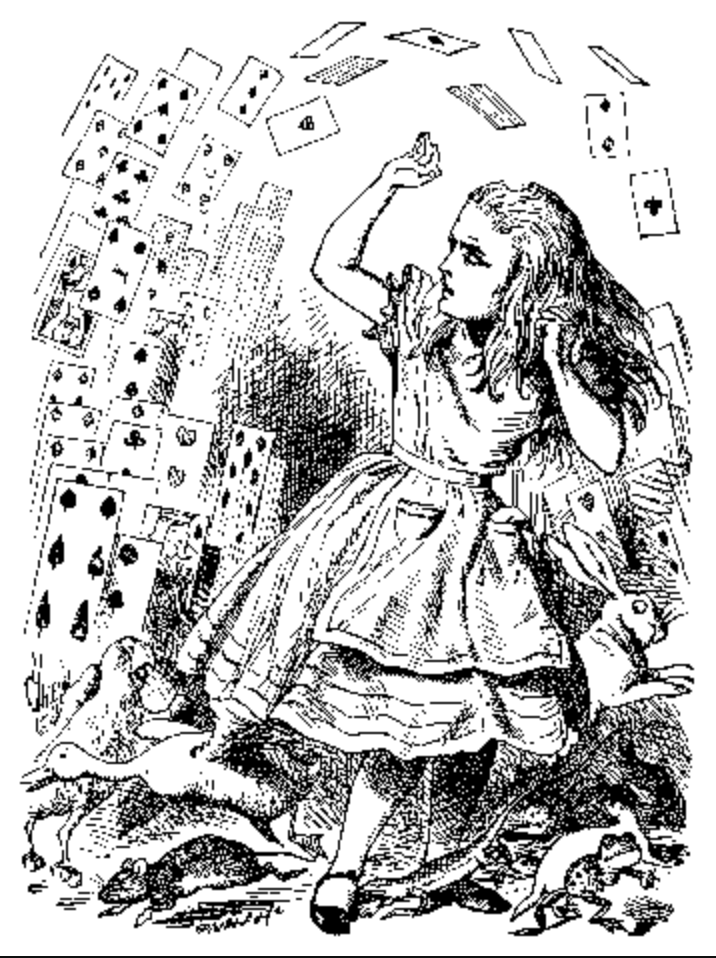
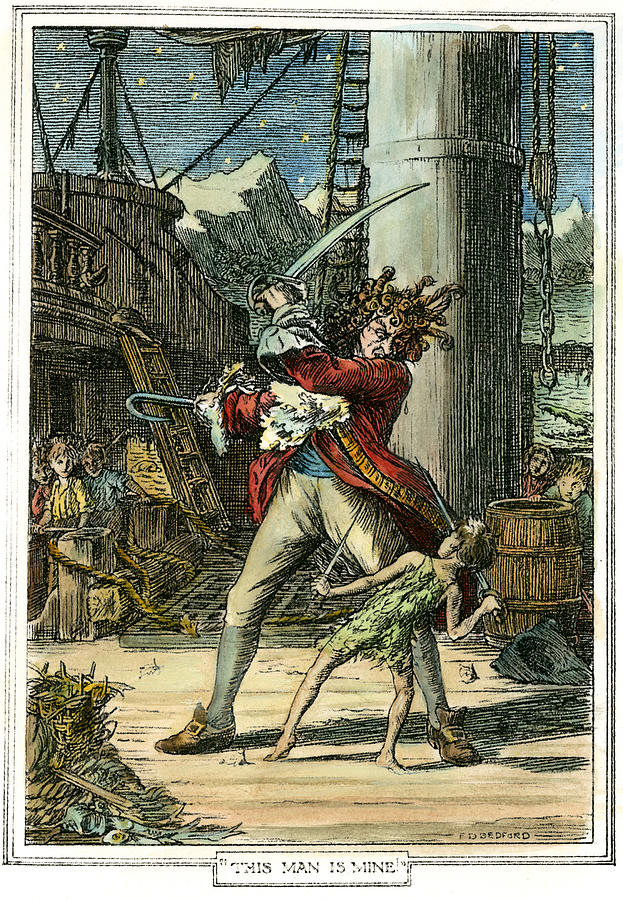
FB
So share with us your theory on Alice in Wonderland and Peter Pan, because both of these stories have been around a long time. I'm curious when you wrote your paper if you have a theory on why these stories in particular have lasted so long.
AK
I had this theory that we were dealing with two main characters, and I'm making Wendy the main character in Peter Pan, who have two completely opposite goals. Wendy’s scared of growing up, but in the end realizes she has to grow up. Whereas I think Alice is feeling frustrated by the grownups and she wants to find a place to belong as a kid. So one character is trying to figure out how to grow up in a way that pleases her and the other one is like, “No, no, I don't want to grow up so fast. I want to stall growing up.” Even though weirdly, Wendy does want to start growing up at the beginning.
But that question of growing up is one of the big reasons they both appeal. Because we've all had our own relationship with growing up. Some people are desperate to get older. I just wanted to be a kid. Teenagers scared me. They scared me when I was a teenager. They still scare me. I respect the heck out of them but they scare me. I liked being a kid and this goes back to the books I like to read. I didn't want to read angsty teen stuff. I didn't want to really read romances. I just wanted to read plot-driven adventures. That's all I wanted. I definitely had desperate friends. “When can I wear makeup? When can I have a boyfriend? When can I be independent?” I think that's very relatable in both Alice in Wonderland and Peter Pan.
Then on top of that, they’re so specific. I've been talking to a lot of kids lately about writing and I feel like the more specific you make a character, the more universal it becomes. You have these incredible specific characters like Captain Hook and the Queen of Hearts. These very meticulously wrought characters have very specific aesthetic features and personality traits that just spark so much imagination. On top of that, for Alice, people have always played make-believe with their cards and their chess boards, tapping into a very basic form of make-believe. Which you also get with pirates and mermaids. You get a lot of classic make-believe stuff that was also particularly popular, I assume, at the time of the original Peter Pan play. It was stuff that kids of that time enjoyed playing so that made it also relatable.
I think there are so many universal themes in both of them and then the specificity of the characters and how enjoyable they are contributes to both stories’ staying power. It’s so fun.
For the latest updates & news about All Things Alice, please read our blog and subscribe to our podcast!